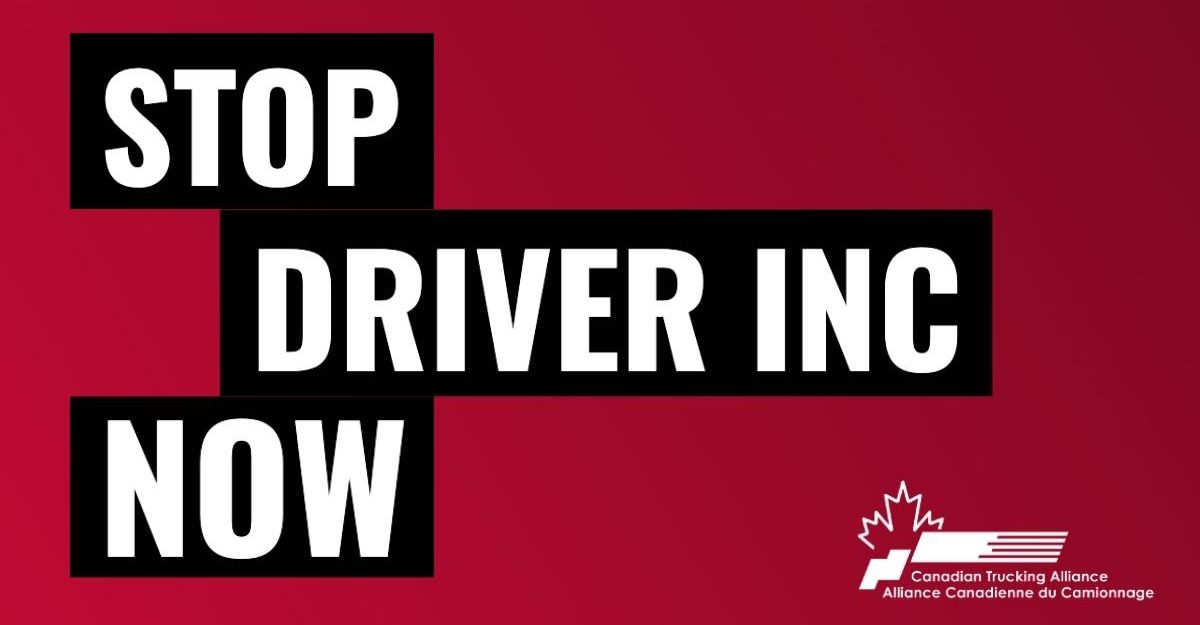Canadian Trucking Alliance calling for immediate government action against ‘Driver Inc.’

The Canadian Trucking Alliance (CTA) is renewing its call for immediate government action against “Driver Inc.” through a massive social media and public relations campaign.
The illegal Driver inc. model that is allowed to fester in the trucking industry is detrimental to Canada’s just-in-time supply chains and law abiding businesses – and it is projected to get worse unless the government acts now. Help us https://t.co/IvhMaPlC1e pic.twitter.com/9jq8LoTnl3
— CTA (@CanTruck) October 26, 2022
In a news release on Oct. 18, the federation of provincial trucking associations alleges that the practice of getting drivers to incorporate “opens the door to the possibility of widespread tax evasion and allows companies to sidestep the Canada Labour Code and all the rights and entitlements afforded to employees.”
“For over five years, the [CTA] has been calling for action on a tax and labour scheme that has emerged in the trucking industry,” the release reads. “It is estimated that [Driver Inc. siphons away] over $1 billion a year in tax revenues from vital Canadian services and infrastructure, with that lost tax revenue being funneled into the underground economy.”
Truck drivers beware
Earlier this year, Teamsters Canada also warned truck drivers about Driver Inc. in a blog post.
“Whether you are a seasoned veteran or completely new to trucking, anyone can fall victim to the ‘Driver Inc.’ scam,” Teamsters said. “Be very careful if you are told to incorporate as a trucking company to make more money. Unless you lease or own your own truck, you are likely walking into the ‘Driver Inc.’ scam.”
The CTA adds that the federal government has “fallen short” on its commitment to end the Driver Inc. after former labour minister Patty Hajdu promised to take action in 2018.
“Without committed action by the end of the year, [Driver Inc.] will likely become solidified as the dominant employment practice as the government moves ahead with the implementation of Bill C-3 – Paid Medical Leave and other planned Labour Code reforms, which Driver Inc. companies claim do not apply to them,” said Stephen Laskowski, president of the CTA.
SEE ALSO
• Major class-action lawsuit launched against Uber, staff misclassified
• Employment lawyer on next steps in massive Uber class-action lawsuit
Are truck drivers federally regulated employees?
Most truck drivers in Canada are federally regulated employees. If a trucking company operates solely in their respective province, then the drivers would be provincially regulated.
A federally regulated employee is a worker whose labour and workplace rights are governed by the Canada Labour Code (CLC).
The CLC establishes basic rights and responsibilities for employees and employers, including:
- Wages
- Health and safety rules
- Statutory holidays
- Severance pay
Despite a variety of federally regulated industries in both the private and public sector, these employees only make up approximately six per cent of the country’s workforce.
LEARN MORE
• Severance packages for truck drivers
• Severance pay for federally regulated employees
How does Driver Inc. affect the rights of truck drivers?
If you are a non-unionized truck driver in Canada, and you register as a corporation, then your employer can treat you as a contractor — rather than an employee.
As a result, you will lose many of the rights and protections provided by the CLC or your province’s employment standards legislation. This includes:
- Overtime and vacation pay
- Rest periods
- Parental leave
- Medical leave
Becoming a contractor also means your minimum entitlements to working notice or severance pay no longer apply if you are fired or let go. Your employer could potentially dismiss you without any notice or compensation.
WATCH: Employment lawyer Lior Samfiru breaks down the misclassification of independent contractors and employees on an episode of the Employment Law Show.
What do the courts think?
Fortunately, courts across Canada aren’t fooled by employers who pay workers through a corporation and misclassify their staff as contractors.
This is only one factor in determining whether or not you should be considered an employee.
Other factors include the level of control your company has over you, whether or not you are able to hire your own helpers, and if you provide your own equipment.
- Example: A trucking company is paying an individual through a corporation, but the worker’s circumstances indicate that they are actually an employee. If the worker is fired or let go without any notice or compensation, a judge could decide that the individual is actually an employee and award them full severance pay.
Can my employer fire me for refusing to register as a corporation?
Truck drivers can be fired by their employer if they refuse to register as a corporation. This is called a termination without cause.
In Canada, companies can let non-unionized employees go for any reason, as long as:
- They are provided full severance pay
- The reasons for their dismissal are not discriminatory
However, a trucking company wouldn’t be able to fire you for just cause if you refused to register as a corporation.
This type of dismissal is reserved for the worst kinds of workplace offences and would prevent you from receiving a severance package or accessing Employment Insurance (EI) benefits.
LEARN MORE
• How to calculate severance pay
• Employment Insurance and Severance in Alberta
• Wrongful dismissal in Canada
Lost your job? Speak with an employment lawyer
If you are fired or lose your job for any reason, contact the experienced employment law team at Samfiru Tumarkin LLP.
Our lawyers in Toronto, Ottawa, Calgary, and Vancouver have helped tens of thousands of individuals across Canada resolve their workplace issues.
We can review your situation, enforce your rights, and ensure that you receive the compensation you are owed.




